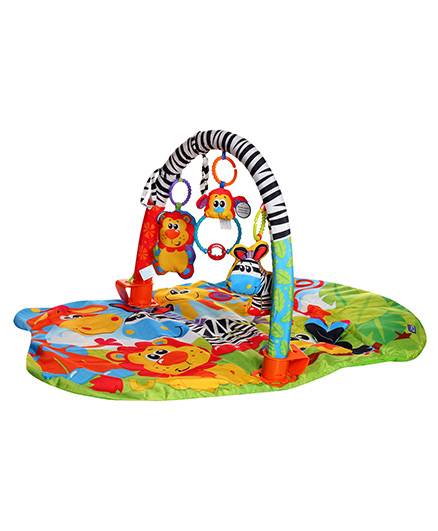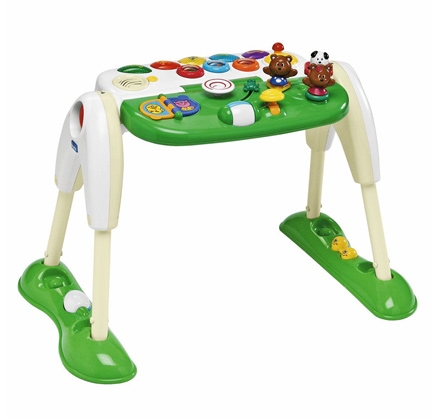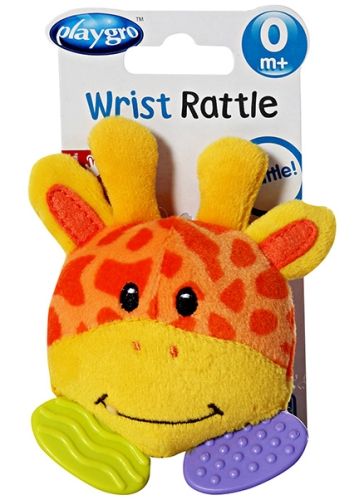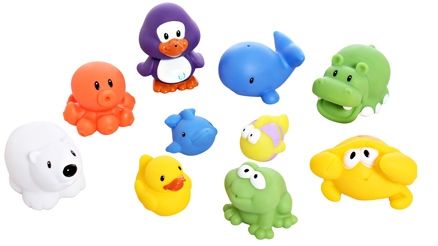Yet I would sometimes wish I had some sort of a ready reference to make it a bit. I'm sure there are parents who have felt the same way. So I thought I should put together a list of toys of appropriate toys specific to the Indian context for kids here. I have also included links of online stores where you can buy them. This list is based on the recommendations of Maryanne Bruni in her book Fine Motor Skills for Children with Down Syndrome (available on Crossword.in).
Important disclaimer: Please note that I have quoted the production description for many of the products exactly as mentioned by the manufacturer/seller. This is not to be taken as an endorsement for any of the products.
Age 0 to 2 years
Baby play activity gym

A whole range of play gyms are now available across India. The Fischer Price Folding Activity Gym which claims to "enhance baby's visual & tactile skills and encourage baby to reach & kick, helping motor skills develop as well as build eye-hand coordination" is available on Babyoye. FirstCry also has a range of baby play gyms that you can find here. Mom&Me has a few options for play gyms and you can find them here.
Prices start from Rs 2199. Alternative: Make your own with some inspiration from Wonder Baby.
Activity centre/ table

This product is Chicco's 3 in 1 Play gym which is available on FirstCry. The product description says that this is a multi-functional activity center with 3 different positions that follow the stages of your child’s growth. "For babies at least 3 months old: The gym can be used with your baby lying down and will help to develop coordination and movement skills with lights, sounds, and the colors of the 3 fun dangling characters.
For babies at least 9 months old: The 3-in-1 play-gym deluxe becomes an activity panel that your baby can use while sitting up. The musical keyboard with its colored keys and fun melodies will stimulate your baby’s manual and audio skills
For babies at least 12 months old: The 3-in-1 Play-gym Deluxe becomes a multi-activity panel that your baby can use standing up. Your baby will enjoy playing with the fun animal characters that will help develop shape recognition. The multi-activity panel will also improve your baby’s manual coordination, logical associative, and musical skills."
Another option is the Fischer-Price Lights and Sounds Table (see below)

Soft wrist toys
These toys weren't available in the Indian market until recently so I was pleasantly surprised to find they are now available here. These are totally worth the price. Maryanne Bruni, in her book Fine Motor Skills for Children with Down Syndrome, says that soft wrist toys help an infant become aware of his hands and help him develop early control of arm and hand movements.

Rattles and squeeze toys
Squeeze toys are good for babies with Down Syndrome as they work the hand and finger muscles as they are squeezed which helps to improve the tone of these muscles.

This pink dolphin squeeze toy is available on Babyoye. Squeeze toys are also easily available at your local toy store. FirstCry has a good range of squeeze toys too. This bunch of squirting toys make a good bath time variation to squeezing activities.

Rattles are possibly the easiest to find on this list. Online stores also offer many options for rattles. Featured below is Chicco's First Boat Musical Rattle available on Babyoye. Also check out the range of rattles on Hoopos.

Chewing toys
These toys are also widely available both online as well as at your neighborhood baby care store. One of my top picks is this Fun Teething Rattle - Elephant from Chicco's at Hoopos.

Touch and feel books
A whole range of touch and feel books are available online. Some great touch and feel books can be found on uRead. AM has a big collection of touch and feel books and her all-time favorite is Baby Hugs (available on Crossword).

These are just a few suggestions. I will be posting a few more lists of toys in the near future.
Thanks for reading